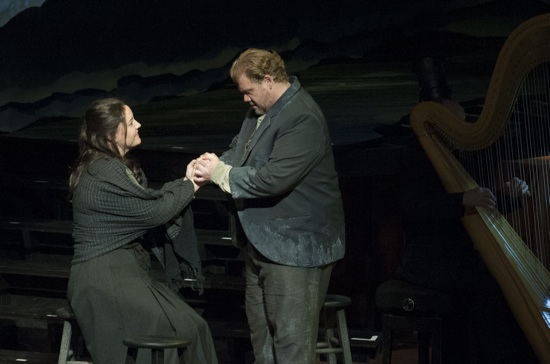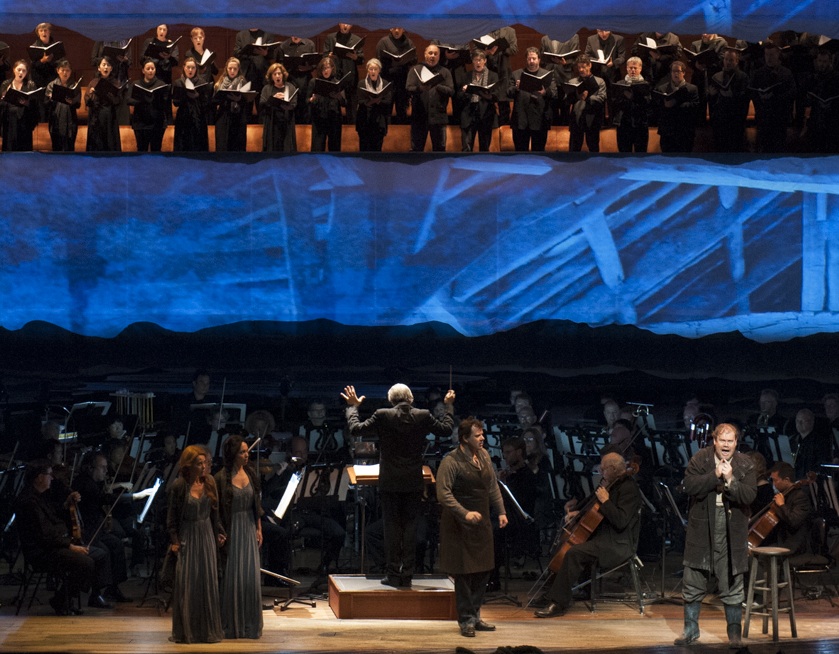Extraordinary experience as climax of Britten festivities
Some operas need all of the glitter they can find. Such was not the case at Davies Symphony Hall on Friday, June 27, where Michael Tilson Thomas led a concert version of Benjamin Britten’s Peter Grimes that emphasized the powerful music and several extraordinary voices, shunning the usual expectation of costumes, staging, sets and lights.
I once saw a Met production of Peter Grimes with black vertical sets and severe costuming, and while that worked well to establish the bleakness of subject, it was all too easy to close my eyes and bask in the music.
What was most appealing about the SF Symphony’s concert version was having a full orchestra on stage instead of a reduced opera orchestra hidden in a pit, and the use of the entire SF Symphony Chorus in the tiers above three sides of the stage, delivering everything from whispers to a gale force of sound, instead of the usual dozen opera choristers singing in clumps around the stage.
Now some operas shine all the more for glitter, but Britten’s music – and gripping story – easily transported us to the harsh English coast. And that story, full of sharp characterizations and poetic libretto by Montagu Slater, defines the grip of society and a love that never quite blossoms. In between the lines, we can hear Britten’s anguish and his own secret life.

The restless keening of violins invoked a sharp British wind in the preludes, music that Britten later reworked into Four Sea Interludes. He creates a sere beauty, a wind that cuts near to the bone. Clarinets and harp enter, transforming that soundscape into the dawn of a splendorous day. Then the brass began to blow, tendrils of an Atlantic storm, and slowly crescendoed into soul-shaking maelstroms.
Completing a year of celebration for Britten’s centennial (he was born on November 22, 1913), MTT delivered an event that had the audience stand and cheer until the performers had all left the stage (usually the audience begins to sneak out first, but we stood our ground until the principals were tired of bows).
Singing the central role of Peter Grimes was Australian tenor Stuart Skelton, and he delivered all of the yearning and violence of that complex character in a voice that contained its own complexities, sharply sweet and hoarsely open, a sort of stone-ground mustardly tenor. He was compelling throughout, and when he later sang “Now the Great Bear and Pleiades,” his long quiet build-up and touch of madness overshadowed everything else in the show.
Balancing him, and the object of his dreams of love, was soprano Elza van den Heever. Over the last five years her voice has matured into a complexity that well matched Skelton – a naturally big voice with a sweet core and iron control. Her fluid leaps, particularly in Britten’s difficult modern intervals, were magical.
Standing out among the large cast was Eugene Brancoveanu, a commanding baritone and a Bay Area treasure, whose acting is always a surprise on top of his fabulous voice. And bass John Relyea was solid in the part of the mono-tonal judge, all deep husks with inner highlights.
And, of course, the SF Symphony Chorus, prepared by Ragnar Bohlin, was simply brilliant.
Above all, what this concert version allowed was insight into the music, which is as brashly contradictory as its characters. Opening with improbably bright music crossed with vocals as flat as an iron, we soon became aware that Britten’s music—and perhaps life—is all about duality.
—Adam Broner
Photo above of the principals, Stuart Skelton and Elza van den Heever; below, cropped stage photo with MTT conducting, and to the right, Eugene Brancoveanu and Stuart Skelton; both photos by Stefan Cohen.

